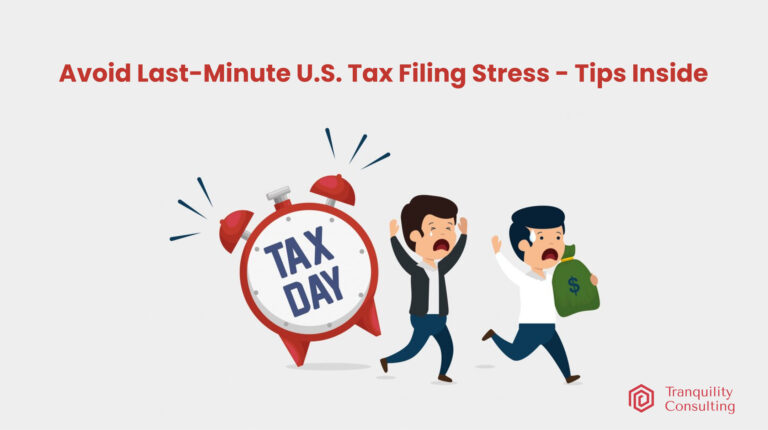US Tax Filing can be a stressful experience, especially when the deadline is fast approaching. For individuals and businesses, waiting until the last minute to file taxes can lead to costly errors, missed deductions, and overwhelming pressure on your CPA team. Preparing early and staying organized throughout the year is crucial to avoid this. In this blog, we’ll explore essential tips to help you stay ahead of tax deadlines and reduce the pressure on your CPA team.
Why Avoid Last-Minute Tax Filing?
Filing your taxes at the last minute can lead to costly mistakes, miscalculations, and omissions. It also places enormous pressure on your CPA team to deliver results under tight time constraints. Moreover, unexpected issues such as missing documents or last-minute tax law changes can create delays and lead to filing errors. Avoiding last-minute tax filing ensures that you file accurate returns, benefit from all eligible deductions, and avoid penalties. Here are actionable tips to keep tax filing stress-free.
Tips to Relieve CPA Team Pressure & Stay Ahead of Deadlines
1. Organize Your Financial Documents Early
One of the most effective ways to relieve pressure on your CPA team is to organize your financial documents well before the tax season begins. This includes income statements, receipts, expense reports, investment records, and other relevant paperwork. When your CPA team has access to all the necessary documents early on, they can work more efficiently and reduce the likelihood of errors or delays.
Pro Tip: Use accounting software or apps to track yearly expenses. This will save time when tax season arrives.
2. Implement a Quarterly Review System
Implement a quarterly review system instead of waiting until the end of the year to review your financials. This allows you to regularly monitor your income, expenses, and tax obligations, making it easier to spot discrepancies and adjust before the year ends. It also reduces the last-minute rush of compiling data, easing the workload for your CPA team.
Pro Tip: Schedule quarterly meetings with your CPA team to review financial performance and discuss tax strategies for the upcoming quarter.
3. Take Advantage of Tax Extensions
If you know that you won’t be able to meet the tax deadline, consider filing for a tax extension. While an extension doesn’t give you more time to pay your taxes, it does provide additional time to file the return. This can help reduce the pressure on your CPA team, giving them more time to ensure your return is accurate and complete.
Pro Tip: Even if you file for an extension, pay any estimated taxes by the original deadline to avoid penalties.
4. Communicate with Your CPA Team Regularly
Regular communication with your CPA team is critical to staying ahead of deadlines. Keep them updated on any significant financial changes throughout the year, such as essential investments, property sales, or changes in your income. This will help them anticipate potential tax implications and ensure you’re not scrambling to provide last-minute information.
Pro Tip: Share access to cloud-based accounting systems with your CPA team so they can review your records in real-time.
5. Stay Informed About Tax Law Changes
Tax laws constantly evolve, and staying informed about the latest changes can help avoid surprises during tax season. Work closely with your CPA team to understand how new tax laws may impact your filing and any potential strategies to minimize your tax liability.
Pro Tip: Sign up for tax newsletters or attend webinars hosted by your CPA firm to stay updated on tax law changes.
6. Address Dependency on Another Jurisdiction’s Accountant for Cross-Border Compliance
If your business operates across multiple jurisdictions or countries, coordinating with accountants from various regions can slow down the tax filing process, especially when cross-border compliance is involved. Each jurisdiction may have different tax laws, reporting requirements, and deadlines, which increases the complexity of managing financials and meeting compliance standards. This reliance on multiple accountants can delay the preparation of consolidated financial statements, further pressuring your CPA team.
Pro Tip: Consolidating all accounting services under one CPA or firm streamlines financial processes, improves coordination, reduces miscommunication, ensures timely cross-border compliance, and leads to faster, more efficient tax filings.
Benefits of Staying Ahead of Tax Deadlines
Reduced Stress
One of the most significant benefits of early tax filing is reduced stress. Knowing that your taxes are filed accurately and on time provides peace of mind, allowing you to focus on other essential aspects of your business or personal life. This is especially true for companies where financial stress can impact productivity.
Maximized Deductions and Credits
Filing taxes early gives your CPA team more time to analyze your financials and identify potential deductions and credits you may have overlooked. This can significantly reduce your tax liability and increase your refund (if applicable).
Pro Tip: Use a tax organizer or accounting software to track deductible expenses throughout the year. This will help your CPA team find eligible deductions during tax season.
Improved Cash Flow Management
For businesses, staying ahead of tax deadlines can improve cash flow management. By estimating your tax liability early, you can plan for payments and ensure that you have enough funds set aside to cover your tax bill. This also helps prevent the need for last-minute loans or credit lines to cover unexpected tax obligations.
Common Mistakes to Avoid When Filing Taxes
1. Procrastination
Procrastination is one of the biggest tax filing mistakes. Waiting until the last minute can lead to rushed decisions, missing documents, and filing errors. Avoid this by setting reminders for important tax dates and staying organized throughout the year.
2. Incorrect or Incomplete Information
Filing taxes with incorrect or incomplete information is a common mistake, especially when under pressure. Double-check all information before submitting your return to ensure accuracy. Mistakes can lead to processing delays or even IRS audits.
3. Overlooking Estimated Tax Payments
If you’re self-employed or own a business, you may be required to make quarterly estimated tax payments. Failing to do so can result in penalties and interest charges. Stay on top of your estimated tax obligations to avoid this costly mistake.
Conclusion
Avoiding last-minute US tax filing is all about preparation and organization. Following these expert tips can reduce stress, relieve pressure on your CPA team, and ensure that your taxes are filed accurately and on time. Whether you’re an individual taxpayer or a business owner, staying ahead of deadlines will save you time and money in the long run. Start organizing your financial documents early, implement a quarterly review system, and maintain open communication with your CPA team. With these strategies, you’ll be able to easily navigate tax season and avoid the pitfalls of last-minute tax filing.
FAQs
1. How can I avoid penalties for late tax filing?
- To avoid penalties, file your taxes by the deadline. If you can’t file on time, consider requesting an extension, but ensure any estimated taxes are paid by the original deadline.
2. What should I do if I can’t pay my taxes on time?
- If you can’t pay your taxes on time, file your return on time to avoid a late filing penalty. You can then set up a payment plan with the IRS to pay off the amount over time.
3. How can organizing my documents relieve CPA team pressure?
- By organizing your financial documents early, your CPA team can process your tax return efficiently, reducing the risk of errors or delays.
4. Are quarterly tax payments necessary?
- Quarterly tax payments are often required to avoid underpayment penalties if you’re self-employed or run a business.
5. How can Tranquility Consulting help with my tax filing?
- Tranquility Consulting provides comprehensive tax preparation and filing services, helping you stay organized and meet deadlines to avoid penalties.
If you have any questions or need business-related tax consulting advice, please contact us at: [email protected]





